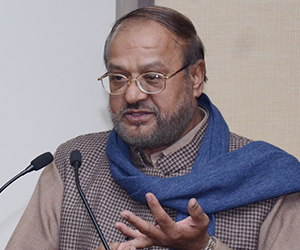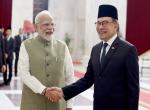In India, it has become customary to abuse the Constitution and/or Constitutional Authority whenever a political party or a political leader is in trouble for its or his misdeeds. Let us not forget that this began with Jawaharlal Nehru himself and also that the very first constitutional amendment bill was introduced in the Parliament on 12th May 1951(six months after the death of Sardar Patel) when the Part III of the Constitution, dealing with the Fundamental Rights, came in the way of certain ill-conceived and ill-timed actions of the then Government. The ultimate abuse of the Constitutional provisions was reflected in the imposition of Emergency on 26th June 1975. Even the most diehard supporters and part of the then regime had this to say:
B.K. Nehru (then High Commissioner to London and Mrs. Indira Gandhi’s cousin): “Jawaharlal Nehru and Shastri ‘knew what a constitution was… [its] checks and balances.’ But Indira Gandhi ‘in the effort to have a populist image…went on the concept of committed democracy, committed judiciary’.1
Romesh Thapar (for long, along with his wife Raj Thapar, a member of Mrs. Gandhi’s Kitchen Cabinet): “The suspension of democracy ‘was the culmination of a process of manipulative politics set in motion many years earlier, and very often the handiwork of supposedly democratic men.”2
We need not go on discussing the reasons for imposing the emergency and converting the country into a Middle Ages European fiefdom. But we need to remember what politicians do when they are in trouble on account of their misdeeds, corruptions, and so on.
What we have witnessed in the last three years (more precisely in the regime of UPA-II) is a large number of scams committed not by a Harshad Mehta or a Natwar Lal. But by the very same people who have been appointed to be its custodians. Commonwealth Games loot, 2G Scam, Coal Mines allotments, and Gas fields’ allotments are just the tip of iceberg. Let us remember that these scams have not been brought out by the investigative journalist like in the 1970s and 1980s but by the Government’s own watch-dog – the Comptroller and Auditor General – having been given the constitutional mandate to keep an eye on the Government’s function concerning the financial matters.
Once the Government was on the mat, its minions started the cacophony – CAG is an agent of opposition, it has not right to question the Government, it has no jurisdiction over the matter and indeed the CAG is incompetent and unqualified. These minions forget that the present CAG, Mr. Vinod Rai, is one of the most outstanding and upright officers of this country. The CAG’s expertise is globally recognized. It has been appointed as external auditor for the International Atomic Energy Agency, World Health Organisation, World Intellectual Property Organisation and several more such institutions based on open bids against competition from Sweden, Germany, France and the UK. We must appreciate that the CAG of India did not win solely on cost but also on technical considerations. Many of its bids were not the lowest.
Worst still for the critics, Mr. Vinod Rai, the CAG, was chosen and appointed by the very same Government which is in power today. But the insinuations and allegations have taken a serious turn and need to be taken note of especially when they emanate from the Cabinet and State Ministers of the Government.
Having being exposed the scam of several Lakhs Crores (it may not be possible even for a highly educated person to write these figures in digits) they have started propagating that one member CAG is no good enough and it needs to be made into multi-member body. For this, they cite the example of the Election Commission.
First, the Election Commission. In order to confuse and convince the laity it is being argued that like the Election Commission the CAG must also be made multi-member body. It appears very fine, attractive and convincing, but let us reflect on as to what are the Constitutional provisions? The provisions of Election Commission are dealt with in the Constitution in the Article 324. The Articles 324(2) and 324(3) say:
(2) The Election Commission shall consist of the Chief Election Commissioner and such number of other Election Commissioners, if any, as the President may from time to time fix and the appointment of the Chief Election Commissioner and other Election Commissioners shall, subject to the provisions of any law made in that behalf by Parliament, be made by the President.
(3) When any other Election Commissioner is so appointed the Chief Election Commissioner shall act as the Chairman of the Election Commission.
It can be seen that our Constitution Makers had provided with the single member or Multi-member Election Commission and indeed who shall be head of this body in case it is multi-member. Thus, the Government was within its Constitutional rights when on 16th October 1989 it appointed two additional Election Commissioners thinking that it will clip the wings of the then Chief Election Commissioner, Mr. T.N. Seshan. It is another matter that today politicians have come to fear it as Damocles sword – be it only for a brief period.
However, the Constitution has dealt with the Comptroller and Auditor General on a very different plane. It must be mentioned here that independent Auditor General has been there even before the independence and it was given independent status even in the Government of India Act 1935. The CAG is dealt with in the Article 148 (Chapter V) of the Constitution of India. Some of its provisions are:
Article 148 (Comptroller and Auditor-General of India)
(1) There shall be a Comptroller and Auditor-General of India who shall be appointed by the President by warrant under his hand and seal and shall only be removed from office in like manner and on the like grounds as a Judge of the Supreme Court.
(4) The Comptroller and Auditor-General shall not be eligible for further office either under the Government of India or under the Government of any State after he has ceased to hold his office.
(6) The administrative expenses of the office of the Comptroller and Auditor-General, including all salaries, allowances and pensions payable to or in respect of persons serving in that office, shall be charged upon the Consolidated Fund of India.
Article 149 (Duties and powers of the Comptroller and Auditor-General)
The Comptroller and Auditor-General shall perform such duties and exercise such powers in relation to the accounts of the Union and of the States and of any other authority or body as may be prescribed by or under any law made by Parliament and, until provision in that behalf is so made, shall perform such duties and exercise such powers in relation to the accounts of the Union and of the States as were conferred on or exercisable by the Auditor-General of India immediately before the commencement of this Constitution in relation to the accounts of the Dominion of India and of the Provinces respectively.
Article 151 (Audit reports)
1. The reports of the Comptroller and Auditor-General of India relating to the accounts of the Union Shall be submitted to the President, who shall cause them to be laid before each House of Parliament.
2. The report of the Comptroller and Auditor-General of India relating to the accounts of a State shall be submitted to the Governor of the State, who shall cause them to be laid before the Legislature of the State.
From the above following points are crystal clear from the Constitution point of view:3
- The use of expression that “There shall be a Comptroller and Auditor-General of India” clearly shows that the founding father of our Constitution had envisaged CAG as a single person Constitutional Authority and not a Commission – be it of one member or multi-member.
- CAG is not appointed by the Government but by the President of India as per the provisions of the Constitution of India and he can be removed only in the manner and on the like grounds as a Supreme Court Judge.
- CAG is not an employee/officer of the Government of India. It is a Constitutional Authority and is answerable to the Parliament and the President of India.
- It is the duty of the CAG to Audit the Government accounts (including the accounts of the state governments) in India to audit all expenditure from the revenues of the union or state governments, whether incurred within India or outside. Specifically, audits include transactions relating to debt, deposits, remittances, trading, and manufacturing, profit and loss accounts, and balance sheets kept under the order of the President of India or the Governors of States. These were the exactly the duties and powers defined also in Government of India Act 1935.
- In order to save CAG from any pressure from any quarter the CAG is not allowed to hold any office after retirement and also all its expenses are met from the consolidated funds of India.
The Article(s) dealing with the Comptroller and Auditor General in the Constitution were debated and discussed threadbare.4 T.T. Krishnamachari, Biswanath Das, K.T. Shah, H.N. Kunzru, and P.S. Deshmukh were among those who participated in debate and moved amendments. Replying to the debate and amendments moved by the members of the Constituent Assembly Dr. B.R. Ambedkar, Chairman of the Drafting Committee, said:
“… (this) dignitary or officer is probably the most important officer in the Constitution of India. He is the man who is going to see that expenses voted by Parliament are not exceeded, or varied from what has been laid down by Parliament in what is called Appropriation Act. If this functionary is to carry out the duties – and his duties, I submit, are far more important than the duties of even of the judiciary – he should have been certainly as independent as the Judiciary. But, comparing the article about Supreme Court and the article relating to the Auditor-General, I cannot help saying that we have not been giving the same independence which we have given to the judiciary, although, I personally feel that he ought to have far greater independence than the judiciary itself.”5
It was unthinkable in the olden days to criticize CAG what to say of attributing motives and hurling invectives. While speaking about CAG Jawaharlal Nehru said in the Parliament:
“For the CAG to be criticized on the floor of the House would tend to undermine his special position under the Constitution and would make it difficult for him to discharge his duties without fear or favour”.
It is not for no reason that Supreme Court recently expressed its anguish in the following words:
"CAG is not a munimji or an accountant or something like that... He is a constitutional authority who can examine the revenue allocation and matters relating to the economy. CAG is the principal auditor whose function is to go into the economy, effectiveness and efficiency of the use of resources by the government. If the CAG will not do, then who else will do it"
It is now time that people in general take note of such utterances against the Constitutional Authorities and take appropriate measures to safeguard the Constitution.
Notes and References
- B.K. Nehru in Sunday Mail, 5 April, 1992; Quoted in Austin Granvuille, 1999, Working of Democratic Constitution: A History of Indian Experience, Oxford, p. 298.
- Romesh Thapar, 1977, The Rear Meat of Emergency, Economic and Political Weekly, April 2, 1997.
- See The Constitution of India, Articles 148-151.
- For details see Constituent Assembly Debate, Vol. VIII, pp. 403-415; Dr. S.C. Kashyap, 2004 (Second Revised Edition), The Framing of India’s Constitution: A Study, New Delhi. Pp. 412-17.
- Constituent Assembly Debate, Vol. III, pp. 407-8.
- Observation of a bench of Supreme Court of India while dismissing a petition challenging CAG reports on 2G spectrum, Coalgate, etc.
Published Date: 26th November 2012










Post new comment